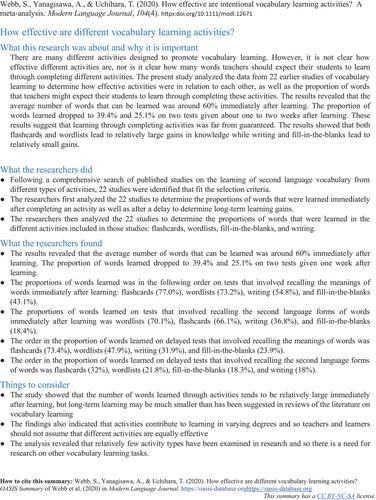当前位置:
X-MOL 学术
›
Mod. Lang. J.
›
论文详情
Our official English website, www.x-mol.net, welcomes your feedback! (Note: you will need to create a separate account there.)
How Effective Are Intentional Vocabulary‐Learning Activities? A Meta‐Analysis
The Modern Language Journal ( IF 7.500 ) Pub Date : 2020-11-02 , DOI: 10.1111/modl.12671 STUART WEBB 1 , AKIFUMI YANAGISAWA 1 , TAKUMI UCHIHARA 1
The Modern Language Journal ( IF 7.500 ) Pub Date : 2020-11-02 , DOI: 10.1111/modl.12671 STUART WEBB 1 , AKIFUMI YANAGISAWA 1 , TAKUMI UCHIHARA 1
Affiliation

|
The present meta‐analysis aimed to summarize the extent to which second language vocabulary is learned from the most frequently researched word‐focused activities: flashcards, word lists, writing, and fill‐in‐the‐blanks. One hundred effect sizes from 22 studies were included in meta‐regression analyses and administered separately for the observations measured with meaning‐recall and form‐recall tests. The results revealed that the average percentage learning gains were 60.1% and 58.5% on meaning‐recall and form‐recall immediate posttests. These gains dropped to 39.4% and 25.1% on delayed meaning‐ and form‐recall tests, respectively. These results suggest that learning through word‐focused tasks is far from guaranteed. Moreover, the percentage learning gains among the different activities ranged from 18.4% to 77.0% on immediate posttests and from 23.9% to 73.4% on delayed posttests indicating that there is much variation in efficacy among the activities. Moderator analyses revealed that learners’ place of study and direction of learning affected learning.
中文翻译:

有意词汇学习活动的效果如何?荟萃分析
当前的荟萃分析旨在总结从最经常研究的以单词为中心的活动中学习第二语言词汇的程度:抽认卡,单词列表,写作和填空。来自22个研究的100种效应量被纳入荟萃回归分析,并分别通过意义记忆和形式记忆测试对观察结果进行管理。结果显示,在意味回忆和形式回忆即时测验中,平均学习增益百分比分别为60.1%和58.5%。在延迟的意义和形式记忆测试中,这些收益分别降至39.4%和25.1%。这些结果表明,通过以单词为中心的任务进行学习远远不能保证。此外,不同活动之间的学习收益百分比范围从18.4%到77。立即进行的后期测试为0%,延迟的后期测试为23.9%至73.4%,表明各项活动之间的功效差异很大。主持人的分析表明,学习者的学习地点和学习方向会影响学习。
更新日期:2020-11-02
中文翻译:

有意词汇学习活动的效果如何?荟萃分析
当前的荟萃分析旨在总结从最经常研究的以单词为中心的活动中学习第二语言词汇的程度:抽认卡,单词列表,写作和填空。来自22个研究的100种效应量被纳入荟萃回归分析,并分别通过意义记忆和形式记忆测试对观察结果进行管理。结果显示,在意味回忆和形式回忆即时测验中,平均学习增益百分比分别为60.1%和58.5%。在延迟的意义和形式记忆测试中,这些收益分别降至39.4%和25.1%。这些结果表明,通过以单词为中心的任务进行学习远远不能保证。此外,不同活动之间的学习收益百分比范围从18.4%到77。立即进行的后期测试为0%,延迟的后期测试为23.9%至73.4%,表明各项活动之间的功效差异很大。主持人的分析表明,学习者的学习地点和学习方向会影响学习。



























 京公网安备 11010802027423号
京公网安备 11010802027423号